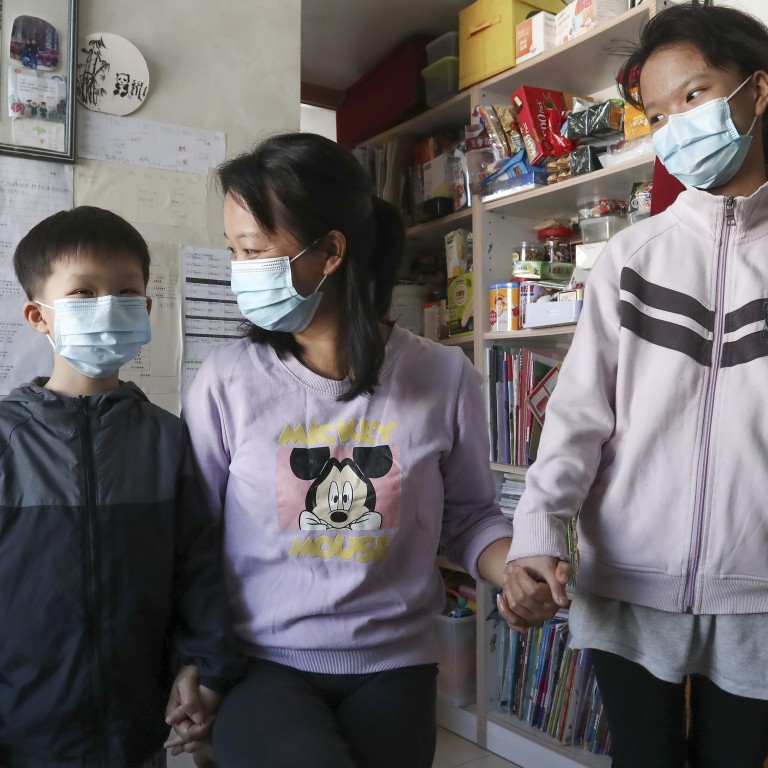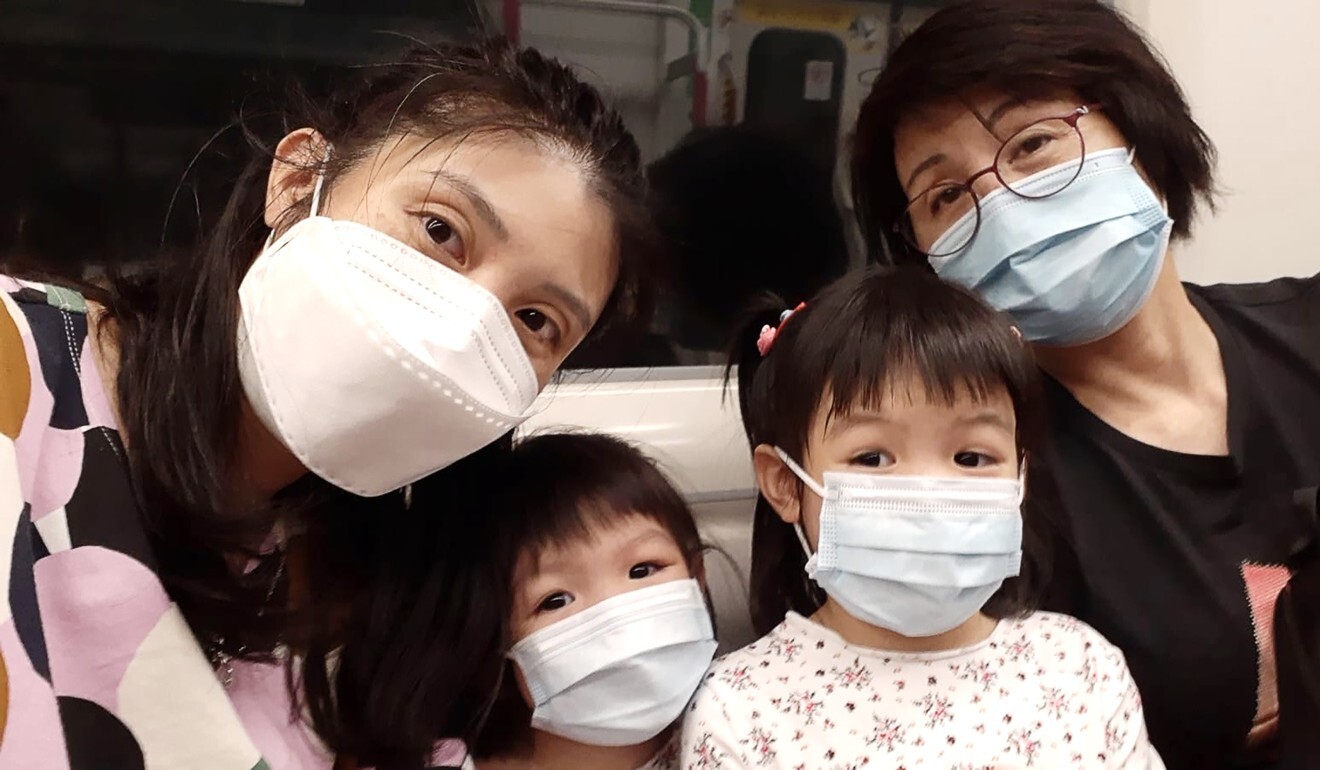
As Hong Kong schools close again, frazzled parents go back to juggling jobs, monitoring kids’ online lessons
- Teachers deal with online teaching challenges too, finding ways to keep students attentive amid Covid-19 pandemic
- Stress levels rise as parents devise ways to supervise schoolwork, attend office meetings
It means supervising their children doing schoolwork over tablet computers, monitoring them via WhatsApp text messages, or leaning more on domestic workers to share the load.
Stay-at-home mother Wong Shui-ying, 43, says her 10-year-old daughter and seven-year-old son get frustrated being confined to their 300 square foot flat in a public housing estate in Sham Shui Po, and her daughter’s schoolwork suffers when she stays home.
“I would like the kids to go to school,” she says. “I am not that worried about the coronavirus, because I think their school does a good job cleaning the premises.”

Hong Kong schools were first shut in early February after Covid-19 struck the city, then reopened in June. When a third wave of infections arrived in July, they were closed once again before reopening in September.
With a fourth wave now upon the city, all kindergartens, primary and secondary schools have been closed once again until next year.
Hong Kong’s two biggest teachers’ unions agree the shutdown is needed, but an online petition has collected more than 1,500 signatures from parents urging the government to reconsider the suspension for kindergartens and nurseries.
They want the authorities to prioritise other options, including closing only schools affected by Covid-19 or those in neighbourhoods with a high number of infections.
Hong Kong has seen a surge in coronavirus infections, with more than 6,500 confirmed cases so far, and 111 fatalities.
Working mother Mangie Wong, 35, recalls that her three-year-old daughter Maia Tse’s first day of kindergarten in September was nerve-racking, with the toddler crying for 30 minutes.
I have to sit with them, because they are not old enough to pay attention and do what is expected of them
Children in masks and matching uniforms lined up to have their temperature checked before only an hour of classes. There were no snack breaks to avoid having the children remove their masks.
Wong, who also has a younger daughter, aged two, says that aside from the first day, Maia soon began enjoying school. “She loved going to school and seeing the teachers and the other kids. She would come home and tell me all her experiences,” she says.
Classes were gradually increased to three hours a day, but it was only a month before schools were shut and Maia had to switch to doing her lessons over a tablet computer.
Wong, who has a legal background, says it is a challenge getting her daughter to concentrate for the 30-minute classes conducted over the Zoom videoconferencing platform. Her husband, 36, works in IT and still goes into the office.
Covid-19 won’t last forever, but online learning here to stay, former Hong Kong finance chief says
Architect Marina Diez-Cascon, 42, knows exactly what that means. From 9am to noon, five days a week, she supervises her five-year-old twins – a boy and girl – and four-year-old daughter as they do their online lessons on tablets.
“I have to sit with them, because they are not old enough to pay attention and do what is expected of them,” says the Spanish citizen who has lived in Hong Kong for six years.
When the children are done, her own work day starts. She and her husband, also an architect, work from home, with Diez-Cascon often finishing at midnight or later. She admits it can be stressful and tiring.
Despite the inconveniences, yoga teacher Victoria Fouladi, 50, believes closing schools was a necessary step to help control the coronavirus and protect those most vulnerable.
The American, whose daughters, aged 12 and 10, attend an international school, says it is because Hong Kong acted quickly to close schools that Covid-19 cases in learning institutions have been low.
“Certainly it has not always been rosy, and sometimes my kids have felt isolated, but they also learn bigger life lessons, such as having a role to play in society and looking after one another,” said Fouladi, whose 81-year-old mother lives with the family.
Property agent Chris Chan, 43, and his wife, who is the same age and works in banking, have devised a routine for themselves and their 10-year-old daughter.
He has to go to the office, while his wife works from home, but she works in a different room from their daughter.
The girl does her schoolwork mostly on her own, and when she is done, sends her father a WhatsApp message to update him so he can check her homework.
“It is more convenient and efficient. If there is something wrong, I advise her, and she can finish her work earlier,” Chan says.
‘Some thrive, others are overwhelmed’
An international schoolteacher of children aged six and seven says teaching online can be difficult, as it can be difficult to view pictures or read what children might want to show the teacher.
The teacher, who asked to remain anonymous, says all schools have been tweaking their approaches, making changes to their curriculums and requiring students to be present throughout Zoom-based teaching periods.
“The first half of the school day, they are really focused, but then you’ll see their eyes wandering, they start looking sleepy. Occasionally, they start climbing on the furniture,” she says. “So we try to keep lessons later in the day a little lighter in content and give them minibreaks throughout the day.”
There has also been a greater focus on wellness this year, with teachers frequently checking with children, as some are stressed by the changes.
They say it’s fine, but when the kids scream, my colleagues are shocked and someone will say, ‘Oh, my goodness, my ears!
“Some thrive, but for others, it is all overwhelming, so we’ve got to monitor their emotions,” she says.
Clinical psychologist Bertie Wai, of Beautiful Mind Therapy and Family Services, says it can be a battle when parents oversee online learning, because they want to help their children but do not have the training to teach.
“That is stressful for both parents and children,” she says.
It helps to establish a routine for children doing schoolwork from home, because the school environment comes with a structure and limits that children find predictable and consistent.
She also believes it is important for parents to spend time playing and talking with their children about matters other than their schoolwork.
“Sometimes kids fight you because they don’t feel that they have a say, but if you can make it more of a conversation and tackle tasks collaboratively, that teaches them so much,” Wai says.
Working parents say they have other issues to deal with when they and their children are at home.
Mangie Wong, with two toddlers, forewarns her colleagues that their Zoom meetings might be interrupted.
“They say it’s fine, but when the kids scream, my colleagues are shocked and someone will say, ‘Oh, my goodness, my ears!’ I think, yes, that is how it works,” Wong says. “It’s embarrassing, but you just have to live through it.”
However, the upside is she gets to spend more time at home with her girls and save on travelling from her flat in Yuen Long, in the New Territories, to her office on Lantau Island.
With schools closed while parents work from home, some of the childcare burden has fallen to domestic helpers, says Shiela Tebia-Bonifacio, 37, chairwoman of Gabriela Hong Kong, an organisation that supports Filipinas in Hong Kong.
A domestic helper in Hong Kong for 13 years, she says that on top of their household chores, the migrant workers have to look after the children while the parents work. Some helpers even monitor the children’s online lessons.
“Our members share ideas about ways to keep the children busy, such as doing artwork, baking, anything to keep them occupied so they don’t bug their parents who are working,” she says.

